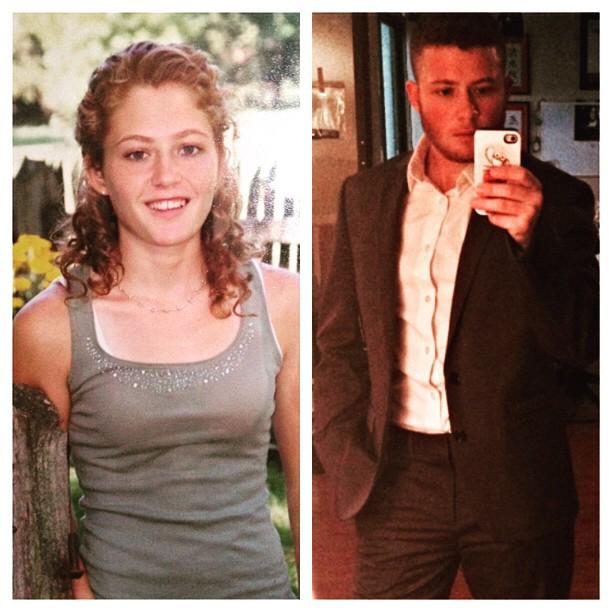When most people come out as trans, they often feel unsafe or ridiculed by society, which makes them want to hide from their true selves. Instead of hiding, SRU alumnus and transman Atticus Ranck, 26, decided to use his transition to educate people on what it means to be trans.
Ranck was born and raised in Lancaster, Pa. to a family with two sisters and a brother. Ranck said his family is very religious, so he attended church often.
“I had a pretty idyllic childhood because I was loved and cared for, and there were no serious issues in my family or anything like that,” Ranck said.
Ranck said growing up, he wasn’t particularly feminine and he often picked out clothes from male sides of stores, but it wasn’t until he hit puberty that Ranck said he started to feel pressured to look more feminine.
“I remember when I bought my first pair of girl pants right before I went into ninth grade,” Ranck said. “I didn’t like them, but my brother and dad were like, no, they look really good,’ and I was like,’ no, they’re so tight.’ My femininity was jeans and a T-shirt.”
Ranck said he would sometimes wear dresses and straighten his hair because he liked the attention he got when he dressed up.
When Ranck turned 17, he came out as a lesbian and started dating a girl. He said once his parents found out, they immediately split them up. Ranck said even then, he didn’t feel trans.
During his years at SRU, Ranck said he started to become more and more masculine and eventually cut off his hair. It wasn’t until graduate school at Florida Atlantic University that Ranck figured out he was transgender.
“I wrote a paper when I took a Queer Sex class about prosthetic penises, which are what trans guys can wear to have intercourse,” Ranck said. “So after the paper, I really wanted to buy one of these, so I bought one, and it was pretty quick after that. I started going by Atticus, I started using male pronouns and then I started seeing a counselor and it was like in hindsight, I should’ve known when I was much younger, but I just didn’t know that trans was a thing or an option.”
Ranck said when he attended SRU, he was president of RockOUT, Slippery Rock’s LGBTQIA organization, for three years. He said perception of the LGBT community was starting to change while he was at SRU, but he said Slippery Rock is very “western Pennsylvania,” and it’s a working class area that doesn’t have a lot of diversity.
“LGBT was still very much people coming from closeted areas or struggling with issues at home, and there was still homophobia in the classroom and among clubs and stuff, so it was definitely something that was difficult to talk about,” Ranck said.
Ranck said looking back, he feels bad because he said he’s sure there were trans people at SRU, because he was trans, but didn’t realize it yet. He said although the culture is shifting, trans is now the next scary thing that people don’t really get.
Ranck now works at SunServe Social Services in Wilton Manors, Fla. as the Director of Transgender Services. SunServe is a LBGT nonprofit organization. He also said he’s an educator, a trainer and a case manager at SunServe. Ranck said right now, he’s the only employee at SunServe in trans services. He said the organization has five different support groups just for trans people, all of which Ranck helps coordinate. He said he also educates a lot of different local organizations.
“I did trainings for recovery centers and the Department of Juvenile Justice for schools and classrooms and different clubs to help them better understand their (trans) clients,” Ranck said. “If you’re a recovery center, you have to put the trans person in with the gender they identify, not based on their biological sex.”
Ranck said his main job at SunServe is case management and advocacy on behalf of his clients. He helps clients get access to hormones and helps them with their mental health. He also said he goes to jails and meets with clients who are incarcerated to help them access hormones or advocate for them when they’re being mistreated.
“I love it,” Ranck said. “I wasn’t really sure what this role would really look like because I basically stepped into the position kind of unsure of the best way to take it. I feel like I’m doing something important.”
Ranck said his sexual orientation is straight. Pre-transition, he was attracted to women, and he said it hasn’t changed.
“I identify as a straight man,” Ranck said. “I recognize that sexual orientation lies along a continuum. It’s not always so fixed. It’s a lot more fluid. I like women, and I have a girlfriend who is straight.”
Ranck said it wasn’t hard for his body to accept that he was transitioning. He said he stopped menstruating right away, which he said was pretty great.
“You have to be careful because what often happens with a lot of my clients is they start transitioning without the help of a doctor, which is really dangerous because that’s not healthy for your body,” Ranck said.
Ranck said he went to a doctor to get blood work done first to make sure that he was healthy enough for his transition, and then started taking the hormones. He said during the first year, he had to get blood work done every month to make sure that he was taking in the hormone well, and then it switched to three months. Now, since he’s been taking hormones for over two years, Ranck said he goes to the doctor every six months to make sure he’s okay.
Ranck said he feels good about his transition, but transitioning and being seen as a man doesn’t solve all his troubles.
“There are still lots of problems that come about because that’s life and that’s what happens, but I never take it for granted.”
Ranck will be coming to SRU on April 13 to discuss his experience as a transman and his work at SunServe Social Services at his presentation, “It’s A Hard Trans Life” at 7 p.m. in the Smith Student Center Theater.









Excellent article. I am very proud to know Atticus and appreciate his openness to educate and help others. 🙂
Excellent article. I am very proud to know Atticus and appreciate his openness to educate and help others. 🙂